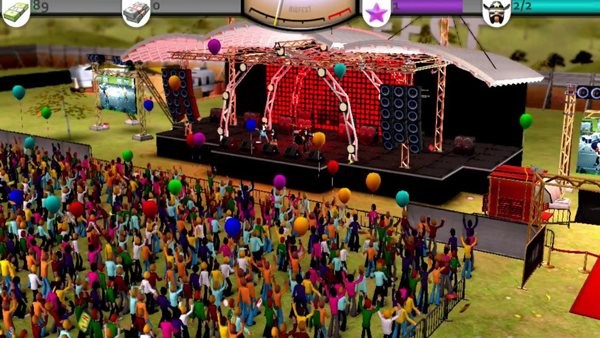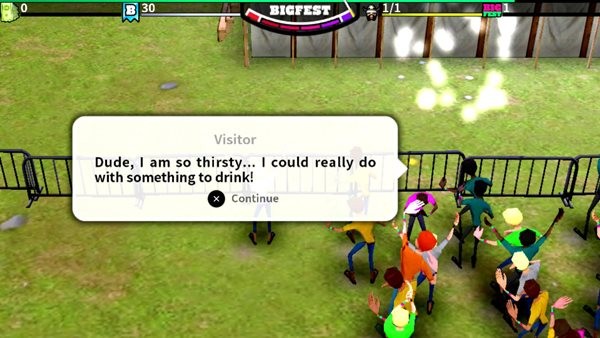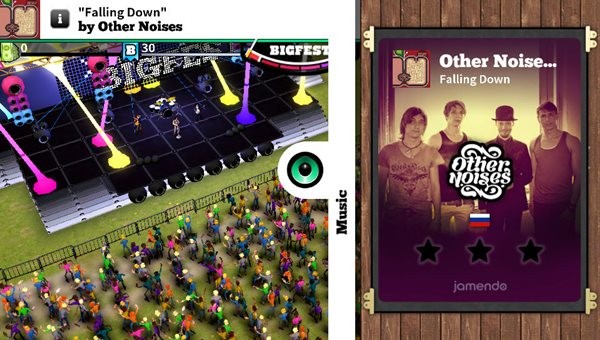Publisher: SCEA
Developer: On The Metal
Medium: Digital
Players: 1
Online: Yes
ESRB: E10+
Years ago, in what feels like another lifetime, I was a concert promoter. It wasn’t my day job or anything; I barely made any money doing it (if I even made any money at all). As far as I was concerned, it was kind of a secondary hobby for me, a labour of love that stemmed from the fact I ran a moderately successful music blog in my spare time, and was looking for a way to help out some of the bands I came across.
While I never put on any giant outdoor festivals, I did put on enough shows — around one hundred or so — and write about music for a long enough time that I feel like I can approach BigFest with something that vaguely resembles expertise. And based on that experience, I can say this: this game kind of gets it.
That’s not an entirely flattering thing to say, mind you. One of the reasons I stopped doing shows was that it started getting tedious; there are only so many times you can book venues and arrange backlines and schedule sound checks before it loses its lustre. As anyone who’s ever promoted shows can attest, it quickly becomes less about doing it because you love music, and more about carrying out a seemingly endless number of annoying, thankless little tasks. For BigFest to capture this feeling almost perfectly means, essentially, that it knows how to make you feel like you’re trapped in a repetitive, moderately boring loop.
Of course, the same could be said for almost any job simulator. The very nature of the genre is to take tasks that would be mundane if they were your real job, and then gamify them. It’s entirely possible that my feelings towards BigFest would be totally different if I hadn’t spent about ten years reviewing music and half a decade promoting shows.
I don’t think so, though. A lot of what makes BigFest feel mediocre will be apparent to anyone who plays it, not just people who’ve listened to way too much lousy music and been to far more concerts than could possibly be healthy.
Take one of the game’s core aspects: discovering new bands and filling out concert line-ups. In theory, that should be incredibly fun — after all, who doesn’t like finding fun new music? In reality, however, you quickly learn that finding new bands means sorting through an endless number of ultra-generic (at best) acts before eventually settling on the ones who offend your ears the least. Like I said: as true to life as that may be, it doesn’t make for a compelling game.
On top of the iffy music selections, BigFest adds a few wrinkles that don’t seem to do much more than make the gameplay more infuriating. Case in point: the way it accounts for the bands? egos. Now, I can attest to the fact that musicians possess some of the most fragile egos imaginable, and are prone to making childish, occasionally incomprehensible demands. Line-up order inevitably becomes a big deal when dealing with these kinds of people. But BigFest?s approach to making that fact an in-game reality — by giving each band a star ranking that compares their relative popularity — is hindered by how few people have, apparently, played the game. It’s not a bad idea, but when every single band seems to have the same level of popularity, it makes it impossible to construct a line-up that doesn’t leave one or more bands annoyed by their spots on the card. I appreciate that BigFest?s creators wanted to push the idea of discovering new music, but the way it’s implemented here is at odds with the game’s objectives.
There’s also the fact that the game is geared towards always being online. While downloading new tracks when you’re playing BigFest at home is obviously no issue, as soon as you leave the house and lose that internet connection, you also limit how much you can do in the game. As is the case with seemingly everything else about this game, it’s a great idea in theory — people will get to discover new music! It leaves room for the game to grow! — but it falls apart in practice.
It?s that disconnect between idea and execution that makes BigFest such a frustrating game to play. Almost every step of the way, you can see what the developers were trying to do — but you can also see where they fell short. If that gap didn?t exist, there?s a good chance this game would be worth playing…but it does exist, which means that you can probably skip it.




